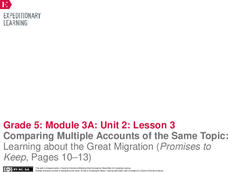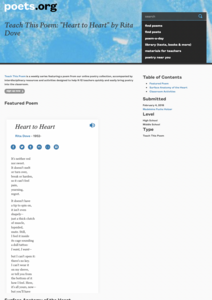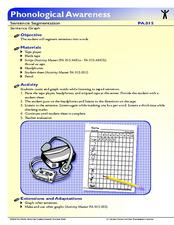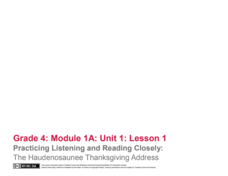EngageNY
End of Unit 2 Assessment: Working with Two Texts - Reading, Listening, Summarizing, and Synthesizing
As a summative assessment for this unit on colonial trade, fourth graders listen to and read informational texts in order to demonstrate their ability to take notes, write summaries, and draw connections. Young scholars first listen as...
Learning Seed
The Art of Listening
Conversation isn't just about talking. Help you class work on the important conversational skills with a lesson plan about listening. As youngsters practice making statements and asking attentive questions, they reflect on the way they...
Curated OER
Phonics Instructional Routine: Read and Write Words with Consonant Digraphs
Use consonant digraphs to introduce learners to word patterns and high frequency words. They observe a chart with the digraphs /sh/, /ch/, /th/, and /wh/. After listening to each of these phonemes, scholars watch as the teacher...
EngageNY
Listening Closely and Taking Notes: Colonial Trade Podcast About the Wheelwright
Voices from the past. Young scholars listen to a podcast interview with a historical re-enactor as they continue their research in the eleventh instructional activity of this unit on colonial trade. Applying their close reading skills,...
Florida Center for Reading Research
Phonological Awareness: Phoneme Blending, What's My Word?
At a listening station, learners listen to a pre-recorded script; they follow the directions and number each picture on their picture chart corresponding to the segmented phonemes they hear.
Florida Center for Reading Research
Word Knowledge
Turn skills practice into a game of Bingo! Scholars listen to words and locate their synonyms on their Bingo cards. The first play to fill their card wins.
EngageNY
Comparing Multiple Accounts of the Same Topic: Learning about the Great Migration (Promises to Keep, Pages 10–13)
Get the story straight. Scholars gather information about the Great Migration as they listen to a reading from Promises to Keep. They then examine the text to find evidence to support the feeling of resentment. Learners take part in a...
Florida Center for Reading Research
Phonological Awareness: Rhyme, Rhyme or No Rhyme
Rhyming is fun, builds phonemic awareness, and is a tried and true pre-reading skill. This activity helps learners identify words that rhyme. Young scholars listen to a song, locate a rhyming word they hear by clapping then draw a...
Scholastic
Reading Success Mini Books: Word Families
Engage children in learning about rhyming words with this printable book on the -ing word family. Including six words with supporting pictures, young learners practice reading and writing the words before adding their own word and...
Curated OER
Do You Want to Be My Friend?
Learners participate in a variety of emergent and early-literacy activities based on a "friendship" theme. Learners listen to the book Do You Want to Be My Friend by Eric Carle, then echo read, choral read, and independently read...
Core Knowledge Foundation
Unit 4: Listen, My Children - Poems for Fourth Graders
Over three weeks, fourth graders explore the world of poetry. They listen to authors such as Shel Silverstein and Maya Angelou, complete word work activities, and practice spelling skills. Budding poets take pen to paper with daily...
Academy of American Poets
Teach This Poem: "Heart to Heart" by Rita Dove
Take heart! Here's a lesson that will encourage learners to notice details. After listening to Sarah Vaughan singing "My Funny Valentine" and noting how the word heart relates to Valentine's Day, scholars observe a human heart image....
Florida Center for Reading Research
Phonological Awareness: Sentence Segmentation, Sentence Graph
Young scholars segment sentences while they listen to a series of sentences. Using a graph, pupils make a mark for each word they hear. Learners listen to each sentence three times; once to listen, once to mark, and once to check their...
Achieve3000
Listening for Main Idea and Supporting Details
Did you hear that? It's the main idea! Teach your class listening and note-taking strategies for determining the main idea by following the steps provided in this plan.
Florida Center for Reading Research
Rhyme or No Rhyme
Scholars listen to a rhyming song, clap when they hear a rhyme, and shake their heads when they don't. They then draw a pair of objects that rhyme.
EngageNY
Reading Closely to Build Background Knowledge: “Myths and Legends”
That is a myth! Scholars take a look at Greek myths referenced in The Lightning Thief. As learners listen to stories in Myths and Legends, they imagine the sights and sounds described. Pupils then talk with partners about specific words...
EngageNY
Listening Closely and Taking Notes in Expert Groups: Colonial Trade Podcast
The twelfth instructional activity of this unit builds on the skills developed in the previous instructional activity, as fourth graders continue their quest to become experts on colonial trade by listening to interviews with historical...
Curated OER
Hero or Tyrant: Connecting Beethoven’s Third Symphony to Napoleon, Part One
The second and third movements of the Eroica, Beethoven's Symphony No. 3, provides listeners with an opportunity to connect to French Revolution and to Napoleon Bonaparte. As they listen to the music, individuals draw what their ears...
Franklin D. Roosevelt Presidential Library & Museum
Pearl Harbor Activity #2: Why Do Words Matter?
Words matter! That's the big idea behind an activity that asks scholars to replace words in FDR's "Day of Infamy" speech with synonyms. They then listen to a recording of President Roosevelt's address and compare his version to their own.
Curated OER
Critical Listening: Music Vocabulary
The school band or orchestra analyzes their own performance after exploring musical terminology. They listen to a classical piece and describe it using only words. They look up musical terminology and then use those words to compare and...
Utah Education Network (UEN)
Reflective Listening Skills
Do you ever feel like your conversation partner is just nodding along as you speak? Encourage teenagers to become reflective listeners with a short activity in which they form responses to assertive statements to reflect what the speaker...
Florida Center for Reading Research
Multiple Meaning Words in Context
Multiple meaning words is the focus of a instructional activity designed to reinforce the use of context clues. Scholars listen carefully to a variety of sentences using the words pool and cast to decide which definition best fits the...
EngageNY
Practicing Listening and Reading Closely: The Haudenosaunee Thanksgiving Address
Thanksgiving doesn't occur only once a year for the Haudenosaunee. Weave an instructional activity about reading closely with an inspiring message about eternal gratitude for all of the elements of creation into a unit on Native American...
K20 LEARN
The History of Spoken Word Poetry: Historical and Cultural Perspectives In Literature
Spoken word poetry, more than almost any other form, reveals the historical and cultural perspective of the poet. High schoolers listen to various spoken word poems, select one to research in-depth, and then apply what they have learned...

























